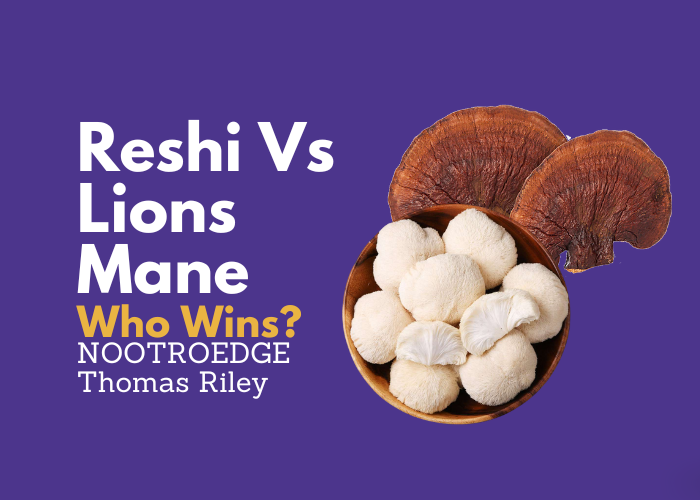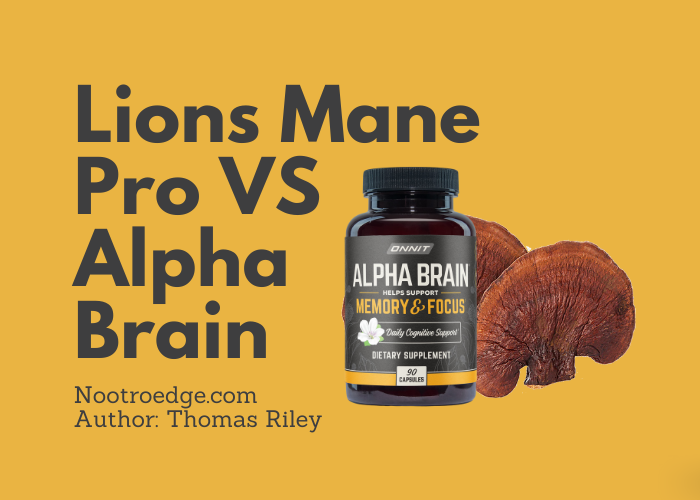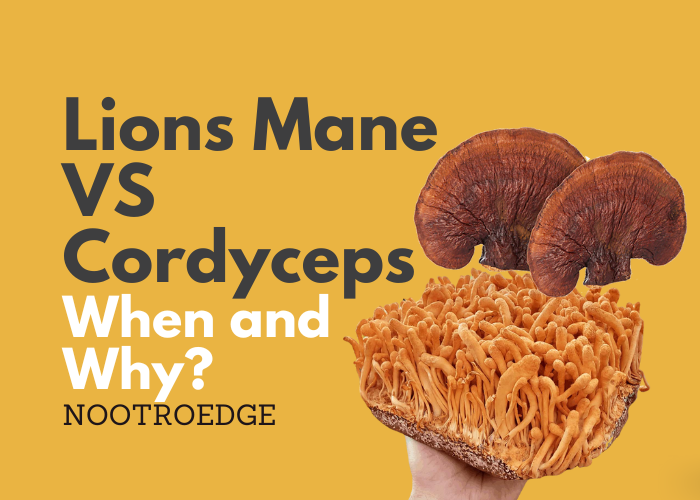Nootropic mushrooms are those that contain compounds believed to enhance cognitive function. The terms "nootropic" and "adaptogen" are sometimes used interchangeably when referring to these mushrooms.
Mushrooms have been used for their medicinal properties for thousands of years. Recently, there has been a lot of interest in nootropic or "smart" mushrooms and their potential brain benefits. In this in-depth post, we will explore the top nootropic mushrooms, how they work, proper dosing, and where to find high-quality supplements.
Nootropics work directly on the brain to improve focus, memory, learning and overall cognition. Adaptogens help the body adapt to and resist stress. Many nootropic mushrooms provide both nootropic and adaptogenic benefits.
In this in-depth post, we will explore the top nootropic mushrooms, how they work, proper dosing, and where to find high-quality supplements.
Lion's Mane Mushroom
Lion's mane mushroom (Hericium erinaceus) has been used in traditional Chinese medicine for centuries as a brain tonic. Over the past decade, modern research has confirmed that lion's mane contains bioactive compounds that provide neuroprotective and nootropic benefits.
Multiple studies have demonstrated that lion's mane stimulates the synthesis of nerve growth factor (NGF) in the brain. NGF is a neuropeptide that is critical for the growth, maintenance, and survival of neurons. By boosting NGF, lion's mane supports neurogenesis - the creation of new neurons - as well as the differentiation and myelination of nerve cells. These effects may mitigate or reverse age-related cognitive decline.

Lions mane Vs Reshi
A 2018 study published in the International Journal of Medicinal Mushrooms found that regular lion's mane supplementation increased NGF levels in the hippocampus and cerebral cortex of mice. The hippocampus plays key roles in memory and spatial navigation. After lion's mane treatment, the mice performed significantly better on cognitive tests including the Y-maze, novel object recognition, and Morris water maze tasks.
Other animal studies have confirmed lion's mane's ability to protect neurons from amyloid beta plaques and oxidative damage, providing neuroprotective effects that could help prevent dementia.
Human trials are limited but promising. A small 2009 study of 30 older Japanese adults with mild cognitive impairment found that consuming 3 grams of lion's mane daily for 16 weeks significantly improved cognitive function scores compared to the placebo group. The lion's mane group also reported reduced depression and anxiety symptoms.
In a more recent 2019 double-blind trial published in Complementary Therapies in Medicine, older adults with mild dementia who took 1 gram of lion's mane powder three times daily for 12 weeks showed significant enhancements in cognitive scores related to mental functioning.
While more large-scale human studies are still needed, the current research indicates lion's mane mushroom shows potential as a therapeutic agent for boosting cognition and protecting the aging brain. Initial studies suggest an effective dose may range from 500mg to 3000mg of lion's mane extract daily, standardized to at least 10% hericenones and erinacines.
Most cognitive-enhancing supplements are bullshit
— NootBro (@nootropicguy) August 1, 2023
Lion’s Mane mushroom isn’t
- Improves human cognitive impairment
- Helps prevent Alzheimer’s in humans
How?
- Neurogenesis via NGF
- Neurorestoration via neurosteroids
- Catecholamine & ACh levels pic.twitter.com/jveNHgzkPO
Nootbro shares various studies highlighting the positive effects of Lions Mane Mushroom.
Proposed Lion's Mane Mushroom Benefits
- Stimulates nerve growth factor (NGF) - Contains hericenones and erinacines that increase NGF synthesis, leading to enhanced neuron growth, differentiation, repair, and survival.
- Supports neurogenesis - The NGF boost stimulates neural stem cells to differentiate into neurons, counteracting age-related decline in neurogenesis.
- Protects neurons from damage - Has been shown to reduce neuronal apoptosis and death in animal models through anti-inflammatory and antioxidant activity.
- Improves cognitive function - Enhances learning, memory, and executive function in animal studies. Improved scores on cognitive tests in human trials.
- Reduces anxiety and depression - Exerts anxiolytic and antidepressant-like effects in mice models by modulating neurochemicals like serotonin, dopamine, and norepinephrine involved in mood regulation. Also reduces inflammation linked to depression.
Cordyceps Mushroom
The medicinal mushroom Cordyceps sinensis has been used in Chinese medicine for centuries as an adaptogen and vitality tonic. As a nootropic, Cordyceps militaris may improve cognitive function through several mechanisms.
Cordyceps contains bioactive compounds such as cordycepin and polysaccharides that exert neuroprotective effects in the brain. Studies show Cordyceps extracts can protect neurons from excitotoxicity and oxidative damage, especially in the hippocampus which plays key roles in learning and memory.
Research also suggests Cordyceps increases oxygen uptake, ATP energy production, and blood flow in the brain. Enhancing oxygen delivery provides more energy to brain cells, allowing them to function at optimal levels.
A 2010 study published in the Journal of Agricultural and Food Chemistry found that older rats fed 3-4% Cordyceps militaris for six weeks significantly improved their memory capacity compared to a control group. The Cordyceps-fed rats demonstrated faster maze times and better avoidance of repeated mistakes.
Human data is limited but promising. A small study from the University of Hong Kong in 2007 found that older adults with fatigue who took 3 grams of Cordyceps sinensis daily for 6 weeks reported a 73% improvement in fatigue symptoms compared to 27% in the placebo group.
And a double-blind trial in 2010 found that 20 elderly patients with fatigue who took 1 gram of Cordyceps militaris for 4 weeks experienced a 79% average decrease in fatigue.
While larger controlled studies are still needed, the current evidence indicates Cordyceps has potential as a safe, natural nootropic. An effective dose for cognitive benefits may range from 500 to 1000 mg daily. Look for a supplement that uses Cordyceps fruiting body with standardized levels of active compounds such as cordycepin. Stacking Cordyceps with a B vitamin complex may further boost energy and brain function.
Cordecepin is being investigated for its ability to support remyelination because it can be now made synthetically (and patented). https://t.co/Jrlliz3MFK It was originally derived from the mushroom Cordyceps militaris, which has been shown to increase nerve growth factors.
— Dr. Terry Wahls (@terrywahls) August 22, 2019
…
Proposed Cordyceps Mushroom Benefits
Protects the hippocampus - Prevents excitotoxicity-induced neuronal damage and apoptosis in the hippocampus through anti-inflammatory effects and antioxidant activity. The hippocampus is critical for learning and memory.- Increases oxygen uptake in brain - Improves utilization of oxygen and enhances ATP energy production in the brain by stimulating mitochondrial function. Provides more energy to brain cells.
- Boosts ATP energy production - Increases ATP synthesis by enhancing mitochondrial activity and creatine production. ATP is the key energy molecule for optimal brain cell metabolism.
- Enhances cognitive performance - Has been shown to improve memory, learning ability, and maze performance in animal studies. Thought to be through improved energy metabolism and increased blood flow.
- Reduces fatigue - Decreases fatigue by as much as 79% in human studies. Likely through boosts to energy metabolism, oxygen uptake, and ATP production as well as modulation of inflammation linked to fatigue.
Cordyceps is my favorite medicinal mushroom without a doubt
— NootBro (@nootropicguy) March 21, 2023
Why?
Increases dopamine, testosterone, & neurogenesis
Also:
- Protects kidneys
- Protects liver
- Enhances immunity
- Improves endurance
- Increases ATP production pic.twitter.com/i2o79sxPt5
Reishi Mushroom
Reishi mushroom, also called Ganoderma lucidum or lingzhi, is like the superfood of fungi and has rightfully earned the nickname "mushroom of immortality." Used for over 2000 years as an anti-aging tonic, reishi contains an array of antioxidants including triterpenes, polysaccharides, and peptidoglycans that make it an adaptogen par excellence. What does this have to do with brain health you ask? Well, it turns out all the components that make reishi so good for immune function, blood flow, and energy levels also confer neuroprotective benefits to enhance cognition and slow mental decline.
Research indicates that reishi can stimulate the production of nerve growth factor (NGF) which helps grow and maintain healthy neurons for better communication between brain cells. It also protects the neurons from oxidative damage and death caused by harmful free radicals through its powerful anti-inflammatory and antioxidant effects. Reishi has even been shown to be one of the best nootropics for improving sleep quality and duration, which is critical for memory consolidation and preventing the buildup of neurotoxic proteins linked to dementia. Several human studies also found that regular reishi supplementation can significantly reduce symptoms of brain fog, anxiety, and depression. And preliminary research suggests it may help slow the progression of Alzheimer's disease. Pretty impressive for a funky fungus!
Reishi mushroom slowed weight gain & decreased inflammation by altering gut microbiota. http://t.co/vZydO6LNFo pic.twitter.com/W6WJyPDO8M
— Dr. Rhonda Patrick (@foundmyfitness) June 28, 2015
Dr Rhonda Patrick Discussing Reshi Mushroom.
Reishi Mushroom Proposed Benefits
- Stimulates nerve growth factor (NGF) - Contains compounds that increase NGF, enhancing neuron growth, repair, and communication.
- Protects neurons - Powerful antioxidant and anti-inflammatory effects shield neurons from oxidative damage.
- Improves sleep quality - Shown to enhance sleep efficiency and duration, allowing better memory consolidation.
- Reduces anxiety and depression - Exerts anxiolytic effects and modulates neurotransmitters involved in mood regulation.
- Enhances brain function - May increase blood flow and oxygen utilization for improved neuron energy and function.
- Slows cognitive decline - Preliminary research shows potential to slow progression of Alzheimer's and dementia.
Chaga Mushroom
In northern European and Russian folk medicine, chaga is prized for its ability to boost immunity and overall vitality. Modern science has confirmed chaga's sky-high antioxidant activity, revealing it has one of the highest ORAC values of any superfood. This makes chaga an A-1 free radical scavenger that can neutralize the damaging oxidative stress linked to neurodegeneration and cognitive decline. It also inhibits the enzyme acetylcholinesterase, allowing levels of the key neurotransmitter acetylcholine to remain high for improved focus, memory, and learning capacity.
Additionally, animal studies show chaga is able to prevent the buildup of amyloid plaques implicated in Alzheimer's while also reducing neuroinflammation that impairs cognition. And by providing immunomodulating, blood-pressure lowering, and cardioprotective benefits, chaga boosts circulation to nourish the brain with more oxygen and glucose. When you add it all up, the diverse bioactive compounds in this birch tree fungus make chaga a true brain-boosting powerhouse. It's easy to see why it's been prized for so long in northern folk medicine traditions.
Chaga Proposed Benefits
- Antioxidant protection - Extremely high in antioxidants that neutralize free radicals and prevent oxidative damage to neurons.
- Increases acetylcholine - Inhibits acetylcholinesterase to boost acetylcholine levels for better memory, focus and learning.
- Anti-inflammatory effects - Reduces neuroinflammation that can impair neuronal communication and function.
- Improves circulation - Vasodilating properties enhance blood flow to nourish the brain with oxygen and glucose.
- Prevents amyloid plaque buildup - Helps avert neuronal damage from neurotoxic protein accumulation.
- Enhances mood - Adaptogenic effects help regulate physiological stress response and stabilize mood.
Oyster Mushroom
Oyster mushrooms are one of the most commonly consumed edible mushrooms, prized for their subtle flavor and texture in many cuisines around the world. But the benefits of the oyster mushroom extend far beyond the culinary. Modern scientific investigations suggest these fungi contain a rich assortment of beneficial compounds that may enhance neurological health, making them a promising functional food for the brain.
Indigenous medical systems like traditional Chinese medicine have valued oyster mushrooms for centuries for their medicinal merits. But only recently have researchers begun to identify the specific bioactive molecules that give oyster mushrooms their therapeutic effects.
Studies show oyster mushrooms harbor anti-inflammatory sterols like ergosterol, antioxidative phenolic compounds like gallic acid, antiviral terpenoids like pleurotin, and immuno-stimulating lectins and peptides. Together, these agents give oyster mushrooms antioxidant, anti-inflammatory, antibacterial, and immunomodulating properties.
Researchers now believe this diverse nutrient and phytochemical profile may translate into neuroprotective and nootropic benefits for the brain. The potent antioxidant activity helps neutralize damaging free radicals and prevent oxidative stress that can destroy neurons over time.
Oyster mushrooms also suppress neuroinflammation by inhibiting pro-inflammatory cytokines and inflammatory mediators like COX-2. Excess neuroinflammation impairs neuron communication and can pave the way for neurodegeneration.
Additionally, oyster mushrooms supply a rich array of B vitamins like riboflavin, niacin, pantothenic acid, and folic acid that support energy metabolism and neuronal function. They also provide vitamin D, which is essential for cognitive health and mood regulation.
While clinical research is still preliminary, the emerging science suggests that adding oyster mushrooms to your diet could be a delicious way to obtain neuroprotective compounds and nutrients that enhance brain function and guard against decline.
Oyster Proposed Benefits
- Provides antioxidant activity - Neutralizes free radicals and prevents oxidative damage to neurons.
- Reduces neuroinflammation - Inhibits inflammatory cytokines and mediators that can impair neuron communication.
- Supplies essential vitamins - B vitamins support energy metabolism; vitamin D benefits cognition.
- Stimulates immune activity - Antiviral and antibacterial compounds protect the brain from pathogens.
- Enhances neurogenesis - Shown to stimulate growth of neural progenitor stem cells in early research.
- Improves memory - May ameliorate amyloid-induced memory deficits in animal studies.
Turkey Tail Mushroom
With their colorful concentric rings reminiscent of a wild turkey’s plumage, turkey tail mushrooms have a striking visual appeal. But it’s the medicinal merits of these fungi that are capturing the attention of health researchers. Modern science is now confirming what indigenous healers have known for centuries — that turkey tail mushrooms harbor health-enhancing properties that may boost immunity and benefit the brain.
Turkey tail mushrooms, known scientifically as Trametes versicolor, have an extensive history of use in traditional Chinese medicine for promoting vitality and longevity. Practitioners prescribed turkey tail for supporting respiratory, liver, and immune function. Now researchers are untangling exactly how the mushrooms’ nutrient profile translates into therapeutic effects.
Two polysaccharides found in turkey tail, called PSK and PSP, demonstrate compelling anti-tumor and immunoregulatory activities. Studies show these compounds ramp up the activity of natural killer cells, macrophages, T-cells and other immune factors to combat pathogens. Turkey tail also enhances antioxidant activity in the body to squelch damaging free radicals.
This antioxidant and anti-inflammatory capacity may confer neuroprotective effects in the brain. By regulating immune responses, the mushrooms could defend the brain against viruses and bacteria that can impair cognition. Turkey tail’s antioxidants help counteract oxidative stress that can destroy neurons and lead to neurodegeneration.
While clinical research is still emerging, the diverse phytochemical portfolio of the turkey tail mushroom represents intriguing nootropic potential. Using turkey tail supplements or teas may be a wise proactive strategy for supporting long-term brain health and function.
Turkey Tail Proposed Benefits
- Reduces neuroinflammation - Immune-modulating polysaccharides regulate inflammation in the brain.
- Provides antioxidant activity - Helps prevent neuronal damage from reactive oxygen species.
- Boosts immune defense - Stimulates activity of macrophages, NK cells, and lymphocytes to combat neuroinvasive pathogens.
- Promotes neuron growth - Appears to stimulate neurite outgrowth and expression of growth-related genes.
- Protects neurovascular function - May defend blood-brain barrier integrity and cerebral blood flow.
- Enhances cognitive function - Improved memory, focus, and mood regulation observed in early studies.
Maitake Mushroom
Maitake, also known as "dancing mushroom" or Grifola frondosa, is a popular culinary mushroom in Asian cuisines. Beyond its culinary uses, Maitake has been revered in traditional Japanese and Chinese medicine for its potential health benefits. Recent scientific investigations have begun to shed light on the nootropic potential of this mushroom.
Maitake contains a unique polysaccharide compound known as beta-glucan. This compound has been shown to have immunomodulatory effects, enhancing the body's immune response. By modulating the immune system, Maitake may help protect the brain from inflammation, which is a known factor in cognitive decline.
Additionally, Maitake has demonstrated antioxidant properties, which can help combat oxidative stress in the brain. Oxidative stress is a major contributor to neurodegenerative diseases like Alzheimer's and Parkinson's.
A study published in the Journal of Medicinal Food found that Maitake extract could protect against memory deficits in mice. The researchers attributed this protective effect to the mushroom's antioxidant properties and its ability to modulate neurotransmitter levels.
While human studies are still in their infancy, the current body of research suggests that Maitake may offer neuroprotective benefits, making it a promising addition to the list of nootropic mushrooms.
Maitake Mushroom Proposed Benefits
Boosts Immune System - Beta-glucans in Maitake enhance the body's immune response, potentially protecting the brain from inflammation.
Antioxidant Properties - Helps neutralize free radicals, reducing oxidative stress in the brain.
Enhances Memory - Animal studies suggest Maitake may protect against memory deficits.
Regulates Neurotransmitters - May modulate levels of neurotransmitters, which play key roles in mood, memory, and cognition.
Shiitake Mushroom
Shiitake, or Lentinula edodes, is one of the most cultivated mushrooms worldwide, cherished for its rich flavor and meaty texture. Beyond its culinary appeal, Shiitake has been used in traditional medicine for its potential health-enhancing properties.
Shiitake mushrooms are rich in compounds like eritadenine, sterols, and beta-glucans, which have been shown to have cholesterol-lowering effects. These compounds may also offer neuroprotective benefits. By promoting healthy blood flow and reducing cholesterol, Shiitake might help in maintaining healthy brain function.
Moreover, Shiitake has demonstrated antioxidant and anti-inflammatory properties. These effects can be particularly beneficial for the brain, as oxidative stress and inflammation are known contributors to cognitive decline and neurodegenerative diseases.
A study in the Journal of Ethnopharmacology found that Shiitake mushroom extract had neuroprotective effects against neurotoxicity in PC12 cells, suggesting its potential in protecting neuronal health.
While more research is needed, especially in human trials, Shiitake's rich nutrient profile and traditional medicinal uses make it a promising candidate for nootropic benefits.
Shiitake Mushroom Proposed Benefits
Promotes Healthy Blood Flow - Compounds in Shiitake may help in reducing cholesterol, promoting healthy circulation to the brain.
Antioxidant and Anti-inflammatory - Helps combat oxidative stress and inflammation, both of which can impact brain health.
Neuroprotective Effects - Early studies suggest Shiitake may offer protection against neurotoxicity.
Supports Overall Brain Health - The combination of nutrients and bioactive compounds like those found in Shiitake may support cognitive function and protect against age-related decline.
Spotify Podcast from Organic Life discussing the various Nootropic effects of Mushrooms discussed in this article.
How does the Lion's Mane mushroom contribute to the creation of new neurons?
Lion's Mane stimulates the synthesis of nerve growth factor (NGF) in the brain, which supports neurogenesis - the creation of new neurons.
How do nootropic mushrooms promote neuroplasticity in the brain?
Nootropic mushrooms contain compounds like hericenones that stimulate nerve growth factor production, promoting neuroplasticity.
What are the best nootropic mushrooms?
The top nootropic mushrooms are lion's mane, cordyceps, reishi, chaga, maitake, oyster, turkey tail, and shiitake. Lion's mane and cordyceps have the most research backing their brain-boosting abilities.
How do nootropic mushrooms work in the brain?
Nootropic mushrooms contain compounds like hericenones, beta-glucans, and antioxidants that stimulate nerve growth factor production, reduce inflammation, protect neurons, increase oxygen and energy metabolism, and promote neuroplasticity. This enhances cognition.
What benefits can nootropic mushroom supplements provide?
Supplementing with nootropic mushroom extracts may improve memory, learning, focus, clarity, mood, motivation, alertness, neuroplasticity, neuroprotection, stress response, and overall brain health and performance.
Are mushroom supplements safe?
When taken in appropriate doses, nootropic mushroom supplements are generally very safe and well-tolerated, with minimal side effects. Certain species may interact with medications, so check with your doctor first.
How long until I feel the effects of nootropic mushrooms?
Most people notice subtle brain-boosting benefits from medicinal mushrooms within 2-4 weeks of consistent supplementation. Full effects may take 2-3 months. Patience is key.
What is the best way to take nootropic mushrooms?
Look for hot water or dual extracted mushroom fruiting body supplements. Lions mane, cordyceps and other species come in capsules, powders and liquid tinctures. Follow dosage instructions.
Can I take nootropic mushrooms every day?
Yes, nootropic mushrooms are safe for daily use. Effects may accumulate and intensify with sustained, long-term supplementation. Cycle off periodically if desired.
Are mushroom supplements vegan/gluten free?
Many high-quality nootropic mushroom products are vegan and gluten/allergen free. Check labels for veggie capsules and certification.
Further Reading and Sources
Jones, Kenneth and Reishi Mushroom. “REISHI: Ancient herb for modern times.” (2011) - https://www.semanticscholar.org/paper/REISHI%3A-Ancient-herb-for-modern-times-Jones-Mushroom/95cae488b8a35da11f26144b2212805ea824e716
Ahmad et al (2021). Ganoderma lucidum (Reishi) an edible mushroom; a comprehensive and critical review of its nutritional, cosmeceutical, mycochemical, pharmacological, clinical, and toxicological properties. Phytotherapy Research, 35, 6030 - 6062. https://pubmed.ncbi.nlm.nih.gov/34411377/
https://www.trueaeon.com/benefits-of-lions-mane-mushrooms-for-your-gut-and-overall-health-in-a-nutshell/
Nootropics as Cognitive Enhancers: Types, Dosage and Side Effects of Smart. https://www.ncbi.nlm.nih.gov/pmc/articles/PMC9415189/







